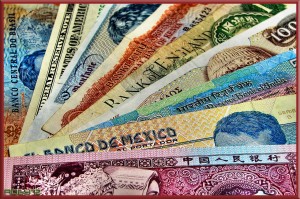China: Replace Dollar as World Currency
 Zhou Xiochuan, head of China’s central bank, published a paper yesterday urging the creation of an international reserve currency independent of the dollar and under the control of the International Monetary Fund. He noted that there is an inherent conflict between domestic political needs and the interest of the entire financial system and implied that the United States has leaned too far towards the former.
Zhou Xiochuan, head of China’s central bank, published a paper yesterday urging the creation of an international reserve currency independent of the dollar and under the control of the International Monetary Fund. He noted that there is an inherent conflict between domestic political needs and the interest of the entire financial system and implied that the United States has leaned too far towards the former.
In my New Atlanticist review essay, “China: We Need New World Currency,” I concede that Zhou has a point.
[N]ow that the Fed is repeatedly pumping out hundreds of billions — even a trillion dollars — seemingly on whim in an effort to jump start the financial system, that era is surely behind us, at least for a while. China’s $2 trillion in Treasury holdings will no doubt be radically reduced in actual value — the ability to purchase goods and services.
Given available alternatives, China will simply have to eat that loss. But one can’t blame them for seeking to provide less risky alternatives for the future.
Much more at the link.

Rolling Stone has a good rant on the things that put us here.
Rank and file Republican provided cover for it, sad to say, but as I’m reading I can’t help but wonder if a 3rd party is going to come out of this.
… I asked a couple days ago if anyone had a non-NY (non Wall Street) solution …
Whatever commission, the IMF or whatever, that administers the hypothetical new currency would be similarly dominated by political concerns. That’s true of any human activity and, given the power that would be inherent in such a currency, the likelihood of corruption is overwhelming. When taken to its logical conclusion Zhou’s argument is either an argument in favor of the gold standard or just plain old sour grapes. Or maybe wanting to get a piece of the action.
BTW there is no barrier to China’s trying to establish a world currency. They’re welcome to try. Note that the Euro was an attempt at just that.
You guys get that this is poker, right? It’s about what Zhou needs to say to get the Fed behavior he wants.
(I don’t think quantitative easing is in response to strictly domestic conditions. Who, for instance, is selling us those long term bonds?)
Note: to those who haven’t been following it, last week the Fed said they were going to buy back our own long-term bonds, in exchange for instant cash. A good summary at the Financial Times
Rolling Stone is to intelligent, thoughtful political commentary as the National Review is to the Emo/Post Punk musical scene.
It was a rant Charles, but I paid careful attention because of that, to see that the facts stated were indeed facts. I think they pretty much were.
AIG blew up because they broke from old and conservative business models to take huge one-sided bets. That was legal, in good part because it was thought that markets were self-correcting, and that regulation was futile.
Wall Street management were just being self-interested crooks. That’s to be expected. What wasn’t really to be expected was that they would get so much political cover, first for that.
“government is the problem”
Tada … multi-trillion dollar bailouts.
Actually, Ben Bernanke agrees on facts with that Rolling Stone article.
Not going to argue with facts, but stating facts isn’t the same thing as making an argument. I tend to be jaundiced against all arguments predicated on “it’s the Republicans fault” or “it’s the Democrats fault” by selectively quoting some facts while ignoring others as there is plenty of blame to go all around. To wit, most people on your side of the echo chamber conveniently tend to ignore the fact that Senator Dodd and Representative Frank stood in the way of attempts to reign in the excesses of Fannie Mae and Freddie Mac in 2003, accusing people who started asking questions of being racists. But sure, it is all the Republican’s fault. Whatever.
But anyway, ya know, government really is the problem. Had risk been properly valued, i.e., no hope of a government bailout, I doubt these massive losses would have been possible. But ever since the S&L debacle, our government can’t help themselves in our Oprahfied culture — and smart money knows this.
Remember, I’m a centrist, as measured by PoliticalCompqass.org – people who see me as a ‘side’ must by definition be on one. (I mostly ignore Democrats because I never was one.)
Second, isn’t it factual that the markets were not self-regulating (in action), as the Republicans were arguing that they were (in theory)?
Upon what do you base that expectation?
An unregulated market will still incentive managers to screw their clients. It’s about the OPM. AKA the Principal-Agent Problem.
(Maybe I’m an ex-Republican the same way some people are ex-Smokers.)
Second, isn’t it factual that the markets were not self-regulating (in action)
False statement of the actual situation. For that to be correct, the banking/finance industry would have to have been an unregulated one. It was and continues to be a very regulated one. I have difficulty finding a more regulated industry. Any ideas?